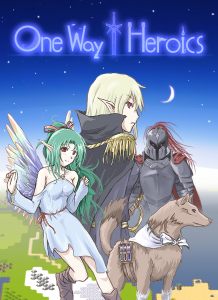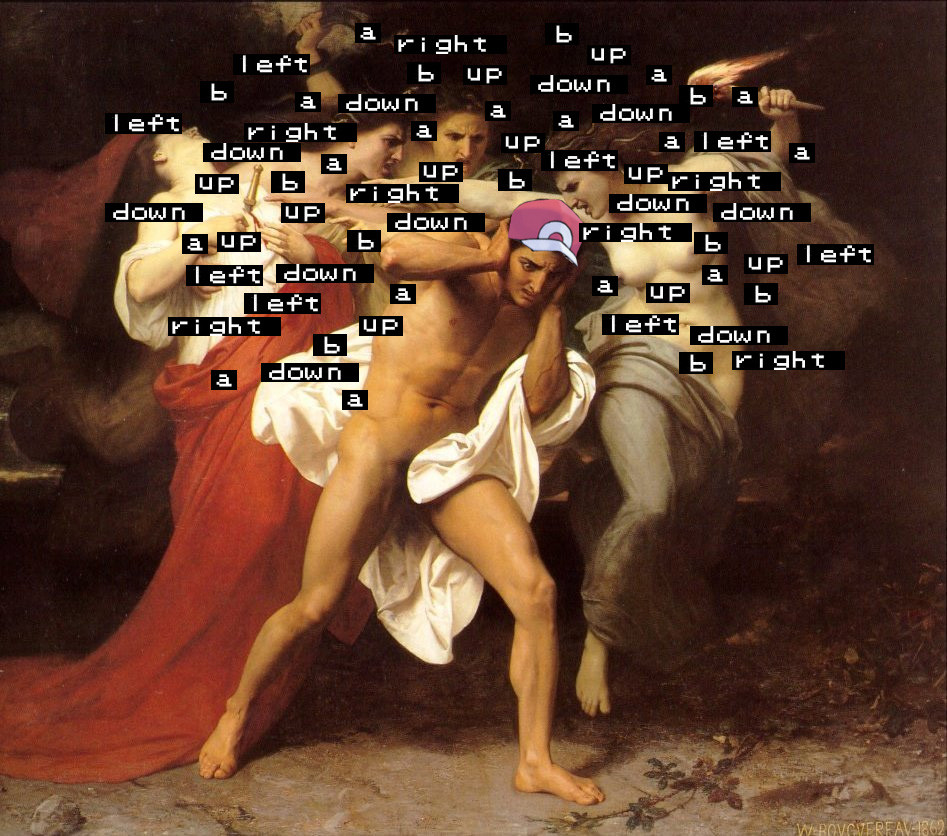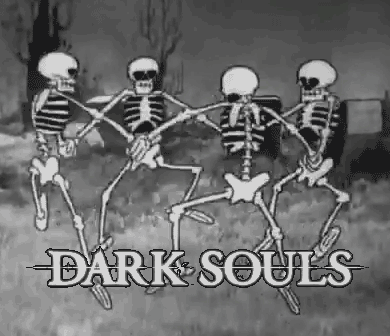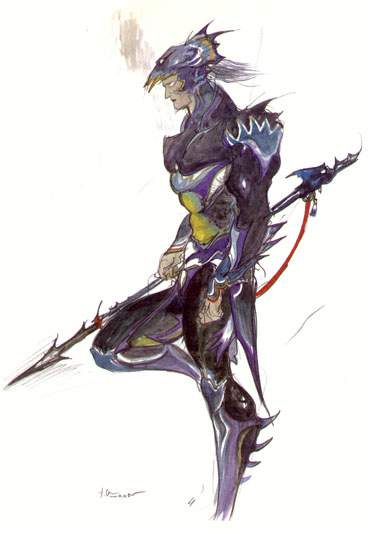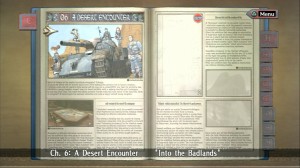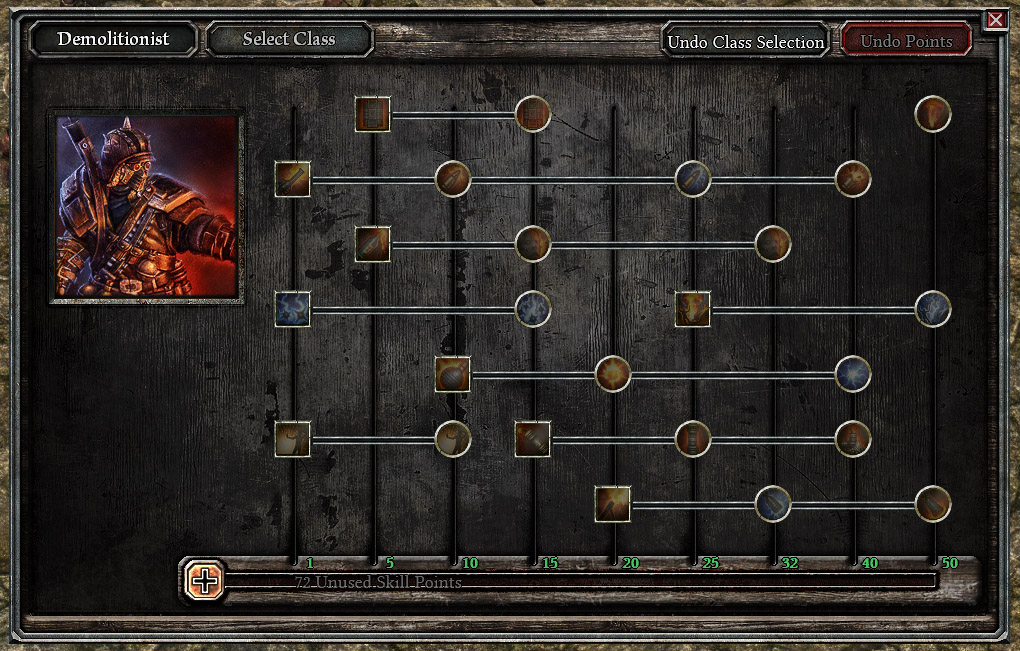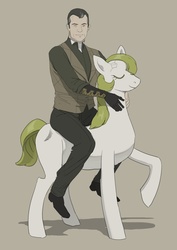We haven’t updated in forever! We apologize and bring you a lovely guest post!
One Way Heroics doesn’t try to bog you down with the kind of grandiose plot commonly associated with JRPGs. The Demon Lord is wreaking havoc and “The Darkness” is sweeping across the land, killing everything it touches. With such a weak context, JRPG fans expecting a quirky narrative will be disappointed. But those looking for a unique side-scrolling experience are in luck.
Thirty seconds after heroic Swordmaster Max is given his quest, he forgets to move right and dies. The tutorial character pops up and ridicules him—or rather, ridicules me—and explains that One Way Heroics is about moving right. Every action causes the screen to move to the right, and if you don’t keep up, the left side of the screen—The Darkness—will instantly and remorselessly murder you. Dead. Game Over.
At first, this forced scrolling mechanic seems punishingly unfair. The first few dungeons are impossible to explore before the screen catches up with you. The good treasure chests take too long to bash open. If you’re impatient or quick to anger, it might only take a single botched run before you wish it were a physical game you could hurl across the room. But One Way Heroics is not a game you win on the first attempt. Or even the second attempt.
If you want to succeed at One Way Heroics, you need to accept one universal truth: the RNG gods are fickle. Max II died in his very first battle. His attack missed, and the enemy wolf double critical hit him for instant death. But quitting is not the answer. In fact, one of the best strategies comes straight from master tactician Zapp Brannigan: simply sending wave after wave of heroes at the enemy will yield progress. Each run awards Hero Points based on stats like distance travelled and number of treasure chests opened. Those points can then unlock new classes, gain new perks, and expand the Dimensional Vault—a persistent, cross-character treasure chest that can be accessed at the start of each run.
Suicide runs are a good way to get familiar with other aspects of the game. Knowing which merchants to speak to and which enemies are tougher than others can save precious time. But it can feel like a tough, lengthy grind before the game actually gets fun. The first two classes—Swordmaster and Knight—are infuriatingly average. Swordmaster draws inspiration from the Fire Emblem class of the same name: hit first, hit often, and do criticals for massive damage. Unfortunately, enemies tend to surround you and simply mosh you to death—assuming the RNG doesn’t screw you first.
If you can stomach the initial difficulty, One Way Heroics is insanely entertaining. But it can feel somewhat like Dark Souls; until you master it, the game is relentless and crushing. Minor errors can leave you trapped behind a wall, without enough time to smash a hole in it. Being economical with actions is the most important skill to learn. Mastering diagonal movement will also save your life more times than a big sword will.
While there are eight classes to choose from, they are somehow simultaneously completely imbalanced and startling samey. My first run with Roger the Pirate was infinitely more successful than every run with a Max. He smashed his way through enemies, walls, and chests like an angry, eye-patched, out of control steam train. He hit more frequently with his giant axe—which carries an accuracy penalty of 15%—than other classes did with swords and other supposedly more accurate weapons. And yet, One Way Heroics can still find ways to screw you over. Roger axed his way through everything, and the Demon Lord still wiped the floor with him because Roger hadn’t channelled his inner Jack Sparrow enough to recruit party members.
The ability to assign five perks—including stat boosts and special skills—helps mitigate some drawbacks to each class, but ultimately some of the classes are more useful than the others. While the classes are designed to be unique, perks whitewash the differences until they all seem about the same. And when you’re out in the field using scavenged equipment, there’s very little difference between the classes anyway. The largest variation in play style comes from equipment choice, which undermines the point of including classes in the first place.
One Way Heroics isn’t a masterpiece but it is really fun—assuming you aren’t put off by the high difficulty curve and frustrating RNG screwballs. The forced scroll mechanic is novel and provides a lot of challenge and strategy to what might otherwise be a walk in the park. Playing with conventions can sometimes result in something unexpected and enjoyable, and One Way Heroics is proof of that.
Now it’s time to see if Max III can succeed where his ancestors have failed.
Today’s post was brought to you by gaming journalist Dakota “Jiro” Barker, who can also be seen at his own gaming news blog Press Start News.

